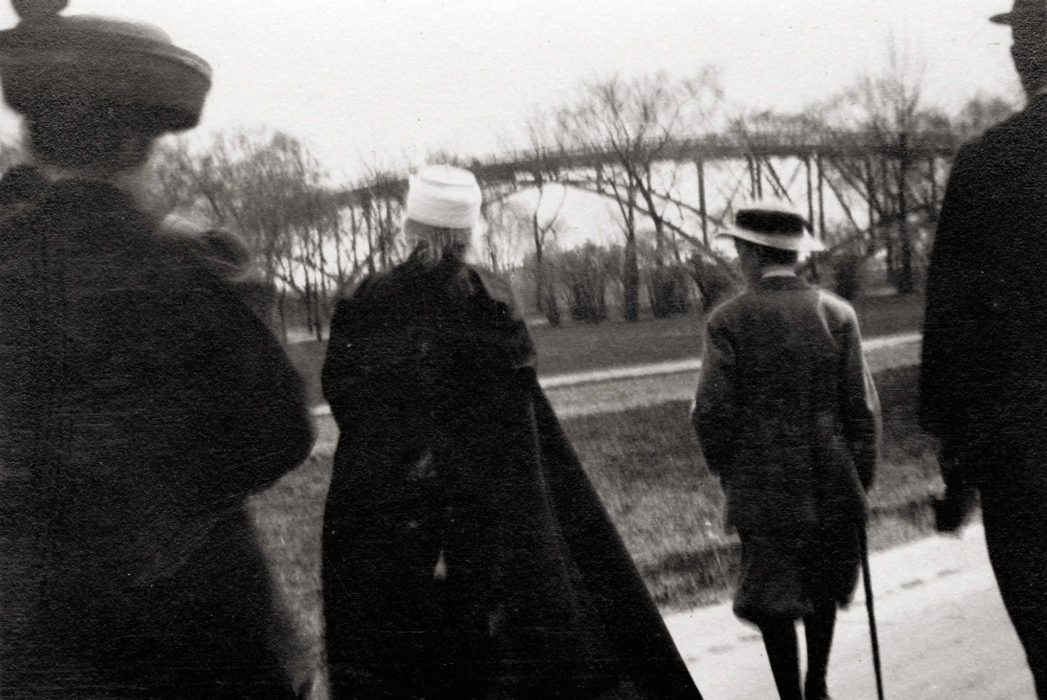THINGS WERE COMING TO an end as ‘Abdu’l-Bahá contemplated the view from his window at the Plaza Hotel at the corner of North and Clark Streets, during his final few days in Chicago. He was preparing to leave America soon, on an early ship from New York after brief stops in Cincinnati and Washington, DC. Across the nation the presidential candidates were wrapping up the campaign season. Almost fifteen million Americans — almost all of them men, almost all of them white — would go to the polls next Tuesday. Even autumn was fighting for its life: the mercury dipped just below freezing overnight on Friday, November 1, and brisk northerly winds raked the leafless trees of Lincoln Park across the street from the Plaza Hotel.
During his stays in Chicago ‘Abdu’l-Bahá made a habit, every morning and evening, of taking walks across the lawns and woods of Lincoln Park, which extended northward from the hotel for a mile and half along the western shore of Lake Michigan. One morning in early May, with most of the tree branches still bare, he visited the Lincoln Park Zoo. Honoré Jaxon was there to tell the story in his sentimental, somewhat grandiose prose. “The many strange and beautiful forms of bird and animal life herein presented,” Jaxon wrote, “proved very interesting to Abdul-Baha, as he walked among them with a manner which somehow reminds one of the legends of St. Francis of Assisi.”

Honoré Jaxon had been born William Henry Jackson in Toronto, but in his younger life he moved west to Saskatchewan, which was then part of Canada’s Northwest Territory. He became a leader in the North-West Rebellion of 1885, the struggle of Métis people against the Canadian federal government, converted to Catholicism, took a French name, and served as Louis Riel’s secretary. After Riel was hanged for treason, Jaxon was declared innocent by reason of insanity and placed in an asylum. He quickly escaped and fled to Chicago, where he joined the labor movement. Many years later, in 1894, he marched on Washington with Coxey’s Army.
After stopping for a photograph with ‘Abdu’l-Bahá, and the twenty or so other people who accompanied them, Jaxon followed ‘Abdu’l-Bahá to a section of the park “where — springing from the midst of heavy bushes on either shore — a single arched foot-bridge rises high above a wide lagoon. . . . The landscape disclosed from this viewpoint is indeed one of the fairest in Chicago.” “‘Beautiful,’ was the comment made by Abdul-Baha in English,” Jaxon wrote, “as he gazed northward from the parapet of the bridge.” The group then sauntered back to the animals, where ‘Abdu’l-Bahá stood “engrossed in contemplating the movements of a majestic polar bear.”
“And now came the most striking feature of the morning’s experience,” Jaxon related as he prepared to bring the story to a fitting end. “From the episode of the bear’s den, Abdul-Baha led the friends toward the lake, and taking one of a number of seats conveniently disposed under a group of trees, invited the friends to likewise be seated. They found themselves arranged in a circle, and, after dictating an answer to a letter which had been read to him that morning as he had walked along, Abdul-Baha suddenly commenced talking to them in a strain of intimate and friendly counsel . . . which warmed the determination of each one to be doubly on guard against any future possibility of becoming a cause of disunion or discord.”

“Some of you may have observed that I have not called attention to any of your individual shortcomings,” ‘Abdu’l-Bahá said, a course of action in stark contrast to the kinds of political activity Honoré Jaxon was no doubt used to, and which was part and parcel of the campaign of 1912. “I want you to be organized like a flock of the doves of Heaven, whose attitude and conduct toward each other is a symbol of that which will take place among human beings when human beings shall become willing to accept the guidance of the Holy Spirit.”
“With those words,” Jaxon wrote about that morning in May, “the homeward course was taken, and so concluded a typical and memorable Bahai meeting in a park, which will ever hereafter be associated in memory with the blessed influence of the ‘Servant of Baha.’”






